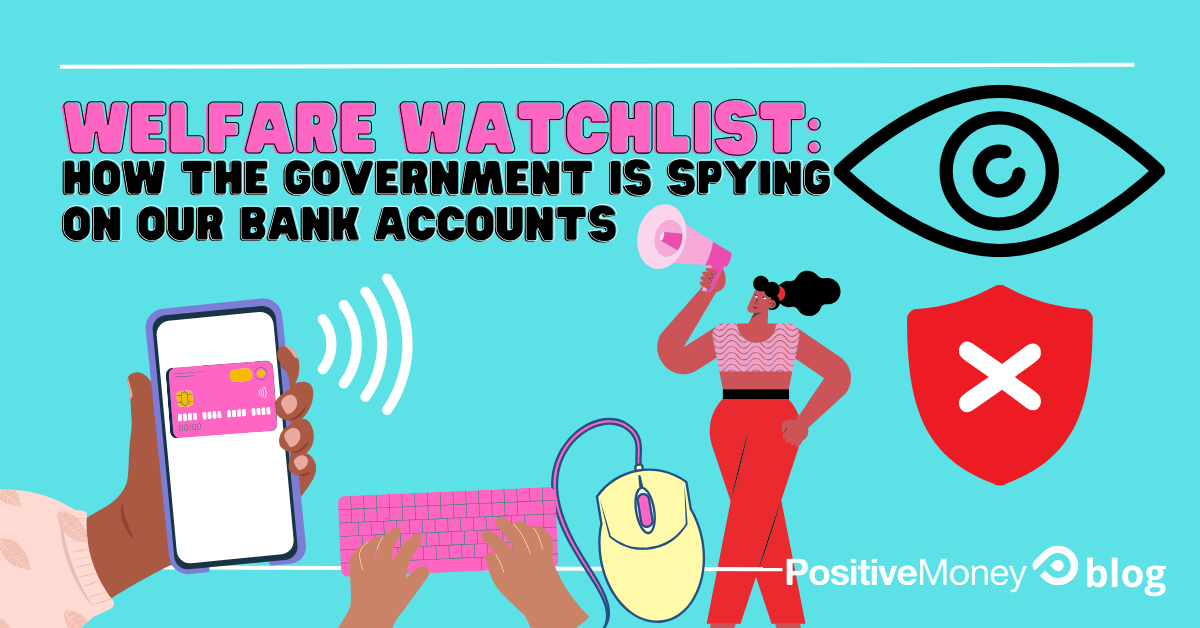
UKEU
18 February 2026
February 12, 2024
Amendments to the 2022 Data Protection and Digital Information (DPDI) Bill will potentially grant the Department for Work and Pensions (DWP) powers to snoop on the bank accounts of benefits recipients, ostensibly to clampdown on fraud. Campaigners have criticised the legislation, arguing it eradicates our civil liberties and right to privacy, dignity and freedom. Also, the use of AI to flag fraud within the welfare system has been likened to digital ‘stop and search’ as it perpetuates algorithmic-bias, determining ‘risk factors’ based on discriminatory indicators that disproportionately target disabled people and migrants.
With an election on the horizon, the government is flicking through its catalogue of scapegoats to avoid addressing the financial hardship families are facing right now. There’s no better example of this than Rishi Sunak’s ongoing battle to pursue his unlawful flagship Rwanda policy in an attempt to whip up divisive and xenophobic, anti-immigrant sentiment. This government’s detachment from the asylum seekers most affected by the policy was cemented by Sunak accepting (then bowing out of) a £1000 bet with TalkTV host Piers Morgan last week that he would get planes in the air before the next general election, highlighting how indifference towards asylum seeker’s misfortunes is being normalised.
And now with the Data Protection and Digital Information Bill (DPDI) having passed the second reading in the House of Lords, amendments to the bill will subject benefits recipients to scrutiny over savings accounts and overseas travel. These additions coincide with a myriad of cruel legislation to debilitate the welfare system in a misguided attempt to get people into work and ‘crackdown’ on fraudulent welfare claimants. This government seems adamant on pitting workers and benefits recipients against each other to win votes, evidenced by Sunak promising to reduce taxes by cutting disability benefits.
The DPDI Bill, introduced by the Secretary of Work and Pensions, Mel Stride, will expand the DWP’s powers to spy on welfare recipients bank accounts. This means nearly 9 million people would be subject to surveillance alongside anyone ‘linked’ to the claimant which could include former and current partners, children, and even landlords.
However, pressure is mounting on the government against the bill, a petition calling for the government to stop scrutinising bank accounts and preserve the dignity and right to privacy of benefits claimants has received over 80,000 signatures so far.
Concerns about privacy and surveillance have been voiced by politicians as well. Lord Prem Sikka likened the bill to ‘Big Brother’ stating that, “In true Orwellian double-speak, the government claims that the bill allows, and I quote, ‘The country to realise new post-Brexit freedoms’ and [justifies] the surveillance by stirring up people’s fears about benefits fraud.” He continues, “While there is absolutely no surveillance of those receiving public subsidies mis-selling financial products, accused of PPE fraud and even a former chancellor who abused the tax system.” Sikka has been vocal on this issue, writing that these proposals “place the poor, disabled, sick, old and pregnant women under surveillance” while “politicians are wholly able to avoid detection when, [advancing] the interests of their corporate paymasters.”
Disabled people are disproportionately flagged for fraudulent welfare claims. Manchester Disabled People’s Organisation (DPO) took legal action against the DWP back in 2021, demanding an explanation for how AI was being used to identify benefit fraud. Civil liberties group Big Brother Watch also led an investigation revealing that local authorities are already utilising ‘secret algorithms’ to surveil benefits claimants’ likelihood of committing, ‘fraud [and] rent non-payments’.
Big Brother Watch’s Poverty Panopticon report notes how the private sector has been offering cash strapped councils (due to austerity) ‘cost-cutting’ solutions to ‘catch out fraudsters’. Oftentimes, “these opaque, invasive and often unfair systems rely on masses of personal data, generalised rules and stereotypes.” The report raised concerns about transparency within the welfare system as well, highlighting that welfare claimants were unaware decisions were being made by an algorithm which they claim is facilitating, ‘a dangerous grey area between automated and human decisions’. In response to the DPDI bill, Big Brother Watch Director, Silkie Carlo said, “Information processing in the welfare system is notoriously bad and the state rifling through millions of people’s bank statements is highly likely to result in serious mistakes.”
What’s worrying is how miniscule benefits fraud is for the government to be undertaking such draconian measures to clamp down on it. The government conveniently fails to mention the billions lost due to error and unpaid benefits. Overpayments of Personal Independent Payment for example, which is paid to people with a disability or illness, accounted for the lowest rates of fraud at 1.1%, whilst the total percentage of fraudulent claims stands at 2.7%. So it appears disingenuous for the government to target benefits recipients with such highly intrusive measures to counter fraud. Comparatively, the government appears far less interested in whipping up a frenzy over the £35.8 billion lost to tax evasion, or recovering the millions lost due to dodgy PPE contracts during the height of the coronavirus pandemic.
It appears the government is using Brexit to fast track legislation that strips away our privacy, whilst protecting the interests of the super rich and powerful. The invasiveness of AI being used to surveil bank accounts was compared to ‘digital stop and search’ in Parliament last week, reinforcing criticisms of the DPDI bill for weakening data protection rights and safeguards. Banks will be forced to hand over personal information to the DWP, a move criticised by the Open Rights Group who pointed out how the financial activities of refugees and migrants could be incorrectly flagged as suspicious. These groups are more likely to send money to family abroad, which further demonises and alienates groups that are marginalised.
This isn’t the only bill through which the government is using Brexit as a smokescreen to roll back human rights legislation and environmental and financial regulations. We’ve been vocal in calling out the vested interests voting on the Financial Services and Markets Act 2023. The recent furore about Labour’s U-turn on banker’s bonuses was only possible because they were scrapped under Liz Truss’ leadership in an attempt to incentivise ‘competitiveness’ within the financial sector. Although it’s increasingly clear that competitiveness objectives are all but smoke and mirrors to proliferate runaway profiteering by banks at the cost of our environment all whilst heightening the risk of destabilising the economy through another recession.
More recently, the government has targeted public bodies’ ability to boycott via the Economic Activity of Public Bodies (Overseas Matters) Bill, which has become even more pertinent due to the ongoing genocide in Gaza. This Bill explicitly counteracts the Boycott, Divestment and Sanctions (BDS) movement’s call for cities and local governments to boycott and divest from Israel in support of Palestinian liberation.
Despite the government hailing Brexit as a liberatory and transformative moment in British politics, in reality we’re seeing our civil liberties eroded in an attempt to divide working-class and migrant communities, stifle collective action and public dissent, entrench profit maximisation for big businesses and maintain Western imperialism. Also, it’s much easier for the government to shirk blame for our falling living standards when politicians and the mainstream media perpetually exacerbate conspiratorial ‘culture war’ issues. Demonising people fleeing war and persecution, striking workers and protestors pushing back against the infringement of our basic civil liberties is a diversionary tactic to avoid awkward discussions about the government’s own failure to address multiple crises (cost of living, climate, housing, mental health), crumbling public infrastructure, and stagnant wages.
These ‘divide and rule’ tactics are nothing new. This latest attack on benefits claimants is reminiscent of the Liberal Democrat and Conservative coalition government led by David Cameron and Nick Clegg who wielded inflammatory rhetoric to stir up tensions between ‘hard-working taxpayers’ and ‘work-shy benefits scroungers’.
This was mirrored in the media by a myriad of ‘poverty porn’ programming (cast your memory back to Benefits Street or On Benefits and Proud), which cultivated an extremely hostile and dehumanising attitude towards the poorest in society. These classist tropes of working-class people manufactured public resentment, paving the way for widespread acceptance of the poor being ‘punished’ through relentless benefit cuts. This created an environment making it much easier for David Cameron’s government to enact devastating austerity measures and benefit cuts (specifically ones designed to shrink the welfare state) – when a fabricated moral panic against benefits claimants attached a negative stigma against them.
A decade on – and the government is hellbent on reprising tried and tested tricks, and with an election fast approaching, it’s not surprising they are still targeting marginalised communities to win votes. And the latest amendments to the DPDI Bill reminds us of the danger AI poses as algorithms can embed prejudice, discrimination and stereotypes by deeming specific traits and characteristics as holding a higher propensity to commit fraud.
If the government is genuinely committed to ending benefits fraud, it’s difficult to see how the DPDI Bill resolves to do this without sacrificing our right to privacy and subjecting vulnerable groups to excessive surveillance. This, alongside the adoption of an array of anti-democratic laws restricting our ability to protest, strike, and boycott, indicates a worrying shift towards authoritarianism – as the government seeks to protect profiteering at the expense of our fundamental freedoms.
There are three petitions urging the government to stop snooping on bank accounts, sign the 38 Degrees one here, Organise Network’s here and UK Parliament’s here.
